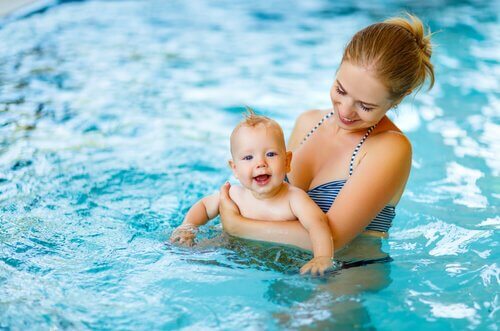4 Tricks to Help Children Overcome Their Fear of Water

Do you want your children to overcome their fear of water, which affects bath time, swimming pools and the sea?
If so, then the first thing you have to do is try to introduce them to these situations in a subtle way that is comfortable for them. Above all, you shouldn’t force them.
We can help them a lot more by taking things step by step rather than by rushing them to get over their fear of water.
It’s worth pointing out that, as long as they don’t have aquaphobia or waterfright, it’s possible to help your children overcome this fear of water without psychological help. If, on the other hand, your child has a real phobia of water, treatment should be structured and guided by a professional.
In this article, we’ll discuss how to act when your child only has a slight fear of water.
4 suggestions to help children get over their fear of water
The fact that children have overcome their fear of water doesn’t mean to say that they’ll become daredevils with no respect for danger. On the contrary, they’ll know how to handle themselves well in both the sea and in swimming pools. To achieve this, just put the following steps into practice:
- Make sure they feel safe. To overcome their fear, it’s essential that children feel safe when in an environment with water. For this reason, it’s vital that their first contact with water is with a trusted adult.
- Progressive adaptation. You should introduce them slowly to the pool or the beach, do it as a game at first. Later, if they seem comfortable, you can allow them to touch water so that they learn how it feels.
- Provide children with swimming aids. You can give your children floats, swim belts or armbands, these will help to increase their confidence in the water. You should check that you’re using equipment for the correct age range to ensure that your children are safe.
- Turn it into a fun game. Games are an efficient way of getting children to overcome their fear of water. In a swimming pool, you can play around the sides or on the stairs, using whichever objects or toys you prefer.
Make bath time fun. You can put music on and sing and play with your children. Let them have some toys in the bath once they’re strong enough to hold them themselves.

Advice to help children overcome their fear of water
In the bath:
Is your child scared of water? Is bath time tense and difficult? If this is the case, then the first thing to do in this situation is make sure that you don’t try to force children into liking water. You should be patient and try to distract them as you carefully lower them into the water.
Although it might seem insignificant, having water that is both clear and at a pleasant temperature will help your children have a pleasant experience in this environment.
Once they’re in the water, don’t leave them alone. Play with them and remind them that the water isn’t a danger at this time.
If they’re still afraid of the water, try bathing with them. This way you can be an example to them, distract them and help them cope with the situation.
Also, don’t bathe them every day, try to give them time. Instead of a bath, they can have a shower or a body wash with soap and water.
In the swimming pool:
For children to overcome their fear of the swimming pool, you should respect their pace and allow them to adapt to the atmosphere.
To achieve this, you can hold their hand and walk them around the edge of the pool. This allows them to observe the other children enjoying themselves in the water.

Your patience is paramount in this process. It’s important to let your children decide when they’re ready to get wet or play with the water. This decision will later lead them to enter the pool.
On the beach:
Many children have a fear of the sea, above all, of the waves and the noise. However, they can overcome it with your help.
You can suggest playing a game on the shore. For example, you can hold your child’s hand and run along the sea shore as the water’s receding, and then do it again as the water comes toward you.
This will allow your child to see how much fun can be had while also becoming aware that the water won’t hurt him.
Another idea is to play with toys in the sand on the water’s edge – toys such as a bucket and spade that they can put the sand in. Having fun with this activity will help them forget their fears, which may help them eventually want to go into the water.
How can you help your children enjoy the water?
You should fill the bath with the correct amount of water for their size (and age). You shouldn’t leave them alone in the water, so that you’re there to help immediately if they slip.
If your child is very young, don’t let him play with bars of soap or bottles of shampoo. Don’t let him play with bottles of talcum powder or perfume either, as he may open them and inhale the contents.
Try to avoid waiting too long to dress children after they’ve bathed. You should dress them straight away, because feeling really cold will make having a bath unpleasant for them.
If you make bathing a nice experience for your children, they’ll be able to adjust to the water without much difficulty. With these little tricks you can help your children overcome their fear of water, to learn to swim and to enjoy the water calmly.
Do you want your children to overcome their fear of water, which affects bath time, swimming pools and the sea?
If so, then the first thing you have to do is try to introduce them to these situations in a subtle way that is comfortable for them. Above all, you shouldn’t force them.
We can help them a lot more by taking things step by step rather than by rushing them to get over their fear of water.
It’s worth pointing out that, as long as they don’t have aquaphobia or waterfright, it’s possible to help your children overcome this fear of water without psychological help. If, on the other hand, your child has a real phobia of water, treatment should be structured and guided by a professional.
In this article, we’ll discuss how to act when your child only has a slight fear of water.
4 suggestions to help children get over their fear of water
The fact that children have overcome their fear of water doesn’t mean to say that they’ll become daredevils with no respect for danger. On the contrary, they’ll know how to handle themselves well in both the sea and in swimming pools. To achieve this, just put the following steps into practice:
- Make sure they feel safe. To overcome their fear, it’s essential that children feel safe when in an environment with water. For this reason, it’s vital that their first contact with water is with a trusted adult.
- Progressive adaptation. You should introduce them slowly to the pool or the beach, do it as a game at first. Later, if they seem comfortable, you can allow them to touch water so that they learn how it feels.
- Provide children with swimming aids. You can give your children floats, swim belts or armbands, these will help to increase their confidence in the water. You should check that you’re using equipment for the correct age range to ensure that your children are safe.
- Turn it into a fun game. Games are an efficient way of getting children to overcome their fear of water. In a swimming pool, you can play around the sides or on the stairs, using whichever objects or toys you prefer.
Make bath time fun. You can put music on and sing and play with your children. Let them have some toys in the bath once they’re strong enough to hold them themselves.

Advice to help children overcome their fear of water
In the bath:
Is your child scared of water? Is bath time tense and difficult? If this is the case, then the first thing to do in this situation is make sure that you don’t try to force children into liking water. You should be patient and try to distract them as you carefully lower them into the water.
Although it might seem insignificant, having water that is both clear and at a pleasant temperature will help your children have a pleasant experience in this environment.
Once they’re in the water, don’t leave them alone. Play with them and remind them that the water isn’t a danger at this time.
If they’re still afraid of the water, try bathing with them. This way you can be an example to them, distract them and help them cope with the situation.
Also, don’t bathe them every day, try to give them time. Instead of a bath, they can have a shower or a body wash with soap and water.
In the swimming pool:
For children to overcome their fear of the swimming pool, you should respect their pace and allow them to adapt to the atmosphere.
To achieve this, you can hold their hand and walk them around the edge of the pool. This allows them to observe the other children enjoying themselves in the water.

Your patience is paramount in this process. It’s important to let your children decide when they’re ready to get wet or play with the water. This decision will later lead them to enter the pool.
On the beach:
Many children have a fear of the sea, above all, of the waves and the noise. However, they can overcome it with your help.
You can suggest playing a game on the shore. For example, you can hold your child’s hand and run along the sea shore as the water’s receding, and then do it again as the water comes toward you.
This will allow your child to see how much fun can be had while also becoming aware that the water won’t hurt him.
Another idea is to play with toys in the sand on the water’s edge – toys such as a bucket and spade that they can put the sand in. Having fun with this activity will help them forget their fears, which may help them eventually want to go into the water.
How can you help your children enjoy the water?
You should fill the bath with the correct amount of water for their size (and age). You shouldn’t leave them alone in the water, so that you’re there to help immediately if they slip.
If your child is very young, don’t let him play with bars of soap or bottles of shampoo. Don’t let him play with bottles of talcum powder or perfume either, as he may open them and inhale the contents.
Try to avoid waiting too long to dress children after they’ve bathed. You should dress them straight away, because feeling really cold will make having a bath unpleasant for them.
If you make bathing a nice experience for your children, they’ll be able to adjust to the water without much difficulty. With these little tricks you can help your children overcome their fear of water, to learn to swim and to enjoy the water calmly.
All cited sources were thoroughly reviewed by our team to ensure their quality, reliability, currency, and validity. The bibliography of this article was considered reliable and of academic or scientific accuracy.
- André, C. (2005). Psicologia Del Miedo/The Psychology of the Fear: Temores, Angustias Y Fobias/Fright, Anguish and Phobias. Editorial Kairós.
- del Agua, A. M. P. (1994). La importancia de los tratamientos en la reducción de los miedos y las fobias infantiles. Revista de psicología general y aplicada: Revista de la Federación Española de Asociaciones de Psicología, 47(3), 321-323. https://dialnet.unirioja.es/descarga/articulo/2164704.pdf
- Jones, M. C. (1924). Elimination of children’s fears. Journal of Experimental Psychology, 7, 382-390.
- Zumbrunnen, R., & Fouace, J. (2006). Cómo vencer el miedo al agua y aprender a nadar. Editorial Paidotribo.
This text is provided for informational purposes only and does not replace consultation with a professional. If in doubt, consult your specialist.








